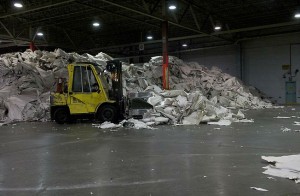Canada can feel proud that its forest products industry has become a world leader in environmental credentials. Source: The Nelson Daily
For an industry that was admittedly once an environmental offender, the past few decades have been a remarkable journey.
The latest statistics show that with more than 160 million hectares, Canada makes up 43% of the world’s independently certified forests.
This is four times more than any other country.
Certification means that companies follow progressive social and environmental forest management practices, as assessed by an independent third body.
This includes prompt regeneration of the forest land, sustainable harvest levels, Aboriginal engagement, and protection of biodiversity and wildlife habitats.
Besides being the world leader in certification, a Yale University study has found that Canada’s forestry regulations and laws are among the most stringent in the world.
By law, all harvested trees are regrown, ensuring forest resources will be there for future generations.
Canada actually has virtually zero deforestation, with a rate of 0.02% each year.
The Canadian forest products industry is also making strong progress in reducing the environmental footprint of its mills, with a 70% reduction in greenhouse gases since 1990.
Air pollutants are down 52% and water pollutants have been reduced by 70% since 2005.
Toxins such as PCBs and dioxins have been eliminated, coal is no longer used, and oil use has been cut by more than 90% since 2000.
Canada also recycles about 70% of its paper and cardboard, making it a top global performer.
Since 2005, waste going to landfills has been cut by 30%.
The sector is also continuing to work with environmentalists, piloting landmark programs such as the Canadian Boreal Forest Agreement.
This represents a paradigm shift as forest companies and environmental groups work together to integrate both environmental and economic values.
Still, the industry is actively striving to do more. Under the sector’s Vision2020, the Canadian forest products industry is aiming to further reduce its environmental footprint by 35% by the end of the decade.
This is based on 12 parameters, including greenhouse gas emissions, energy and water use, and caribou action plans.
The Canadian forest products industry has come a long way in both its practices and its approach.
The sector realizes that being a responsible steward of the land is an essential part of its social license to operate. And the international marketplace has taken note.
A 2014 Leger survey of international customers found that Canada’s forest products industry had the best environmental reputation in the world.
All in all, the industry is firmly dedicated to ‘growing a greener tomorrow”, using Canada’s renewable forests to benefit both the environment and the economy.








